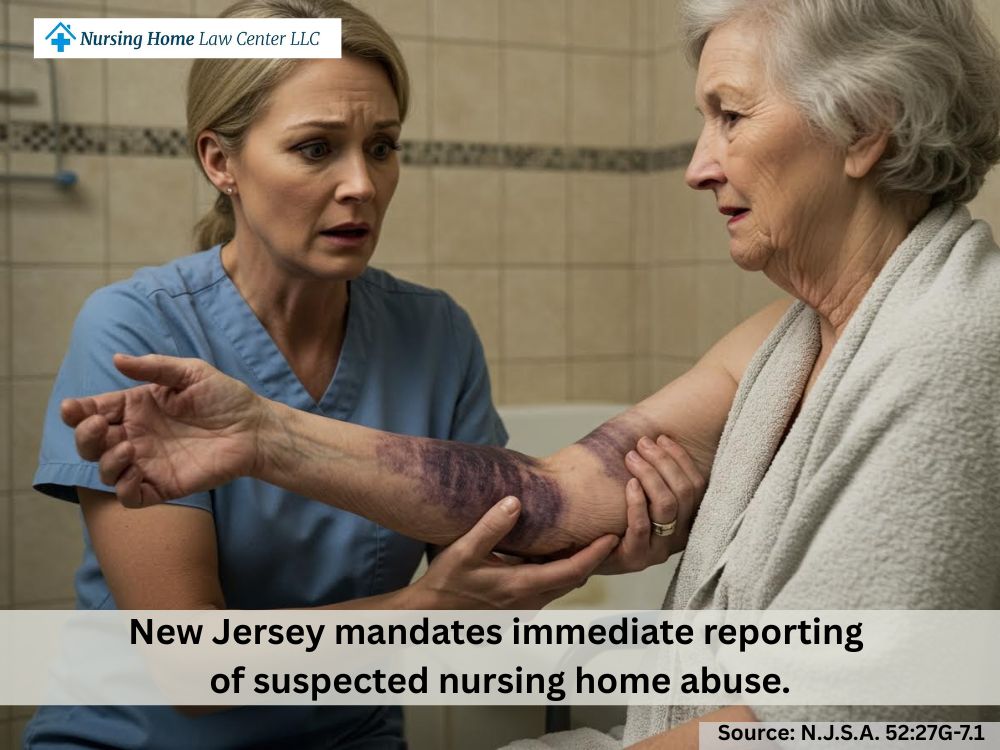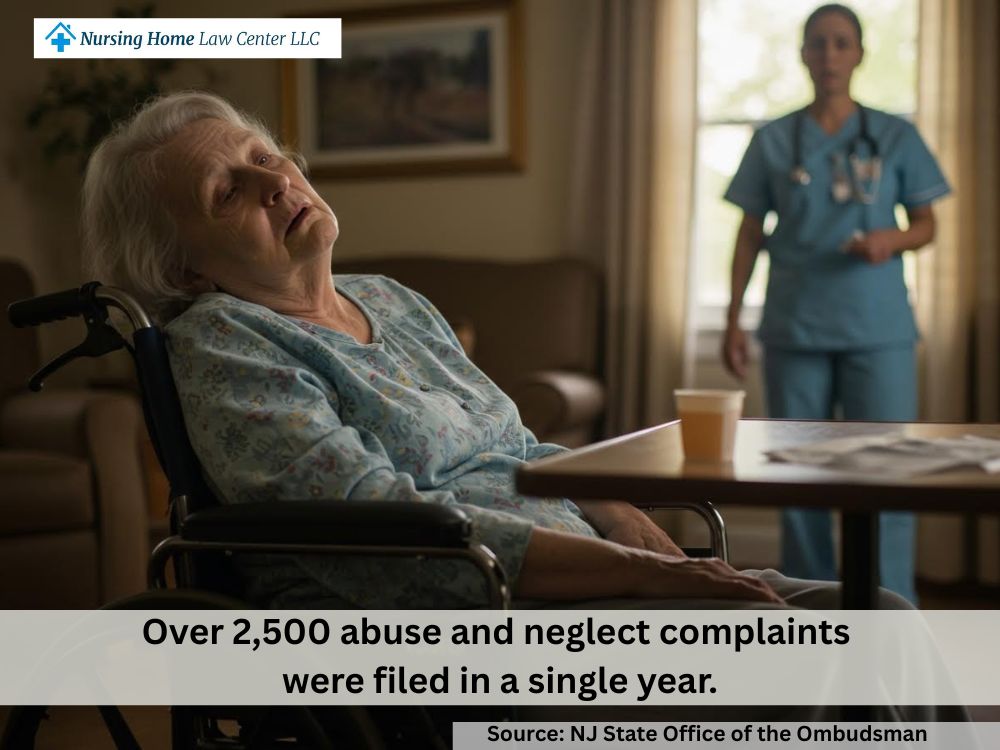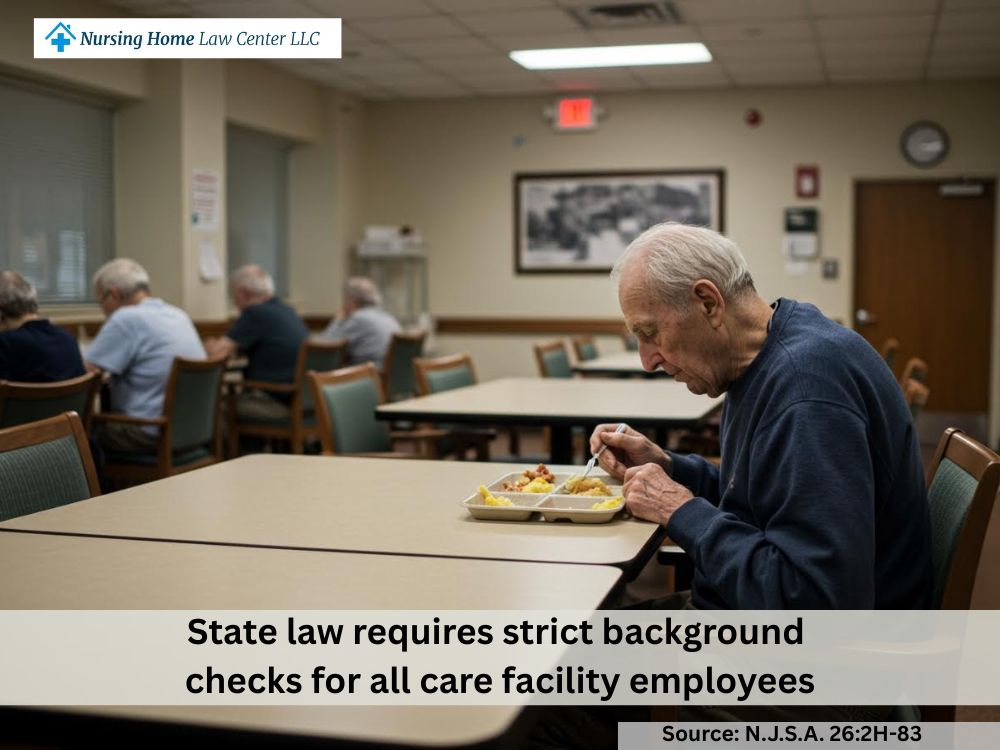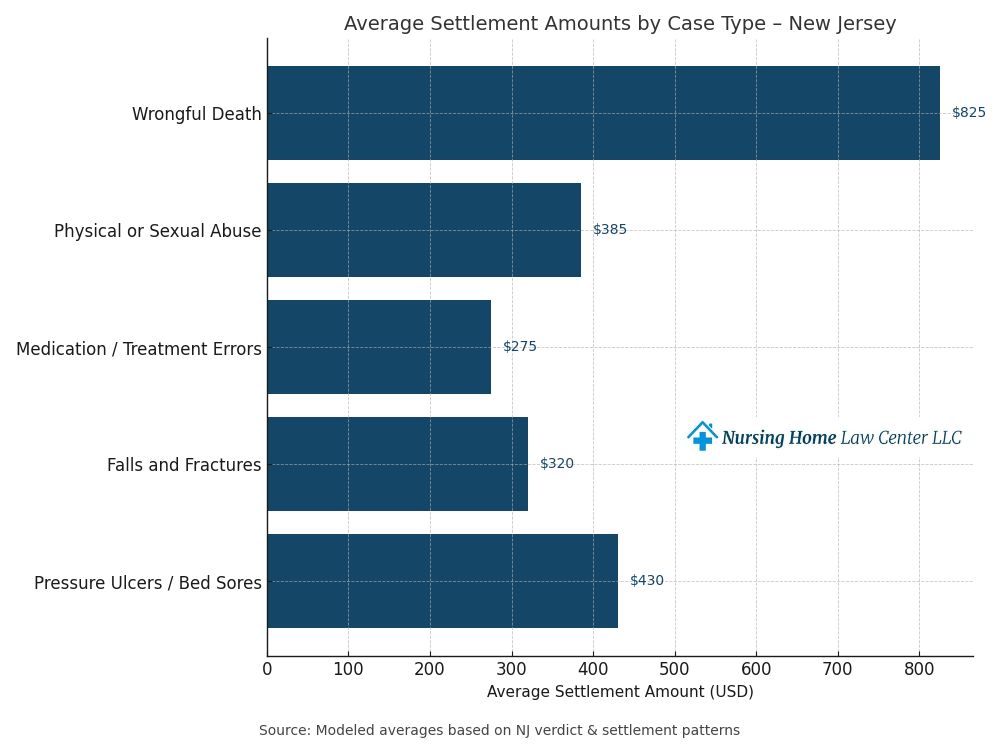The Nursing Home Law Center is committed to providing the legal resources necessary to hold negligent facilities accountable.
New Jersey Nursing Home Abuse Lawsuit Settlements
If your loved one suffered harm in a long-term care facility, the Nursing Home Law Center is here to help you understand your legal options. We focus on assisting families to pursue New Jersey nursing home abuse lawsuit settlements to hold the responsible parties accountable and recover financial compensation for medical bills, emotional trauma, and wrongful death.
Our experienced attorneys represent victims throughout New Jersey, providing guidance and support every step of the way. Whether the abuse involved physical injuries, mental abuse, or neglect, we work to ensure your family receives the justice and financial relief you deserve.

Settlement and Verdicts Recovered by Our Nursing Home Abuse Lawyers
Our team of New Jersey nursing home abuse lawyers has decades of experience representing victims of abuse and neglect, securing meaningful settlements, and holding negligent facilities accountable statewide.
- $1,200,000 Settlement – Linda, a disabled resident of a New Jersey nursing home, suffered multiple injuries when a facility-operated van crashed during transport. The driver, a staff member without proper training, failed to secure her wheelchair, causing her to be violently thrown inside the vehicle. Her injuries required extended hospitalization and ongoing care. The significant payout reflected the severity of her condition and the facility’s failure to follow safety protocols set by New Jersey regulations.
- $735,000 Settlement – Mary, an elderly resident at a nursing home in southern New Jersey, fell from her wheelchair after it was left unsupervised near a sloped hallway. She sustained a fractured leg along with lumbar and cervical spine compression fractures. The facility had a history of multiple falls and prior citations by the New Jersey Department of Health. Her case value increased due to documented staff negligence and the long-term impact on her mobility and independence.
- $610,000 Settlement – James was severely injured after two aides at a Jersey nursing home improperly used a Hoyer lift during a routine transfer. He was dropped to the floor, suffering a fractured hip and internal bruising. Investigations revealed the staff lacked the required training and violated the facility’s care plan protocols. Witness statements and incomplete incident reports added weight to the claim, leading to a settlement that helped cover physical therapy, ongoing care, and pain management.
What Types of Financial Compensation Can Be Recovered Through a Nursing Home Abuse Settlement?
Nursing home abuse settlements aim to help families recover financial support for the harm their loved one has suffered. Compensation depends on the severity of the abuse, the extent of medical treatment needed, and the impact on the resident’s life. Below are common damages that may be included in nursing home abuse settlements.
Medical Bills
Victims of nursing home abuse often require extensive medical care, from emergency treatment to long-term care. Settlements can cover both current and future medical bills tied to the abuse, including costs for treating pressure ulcers, broken bones, or injuries from multiple falls.
These financial resources help families avoid the burden of paying out-of-pocket for conditions that were preventable.
Emotional Distress
Elderly victims frequently suffer emotional trauma in addition to physical injuries. Symptoms can include anxiety, depression, and fear, especially in cases involving psychological abuse or neglect. Nursing home abuse settlements may consist of compensation for this emotional distress, recognizing the lasting psychological toll.
New Jersey courts often consider the resident’s mental state, medical records, and professional evaluations when assigning value to these non-economic damages.
Relocation Costs
After discovering abuse or neglect, many families are forced to move their loved one to a safer facility. This process often involves transportation, new admission fees, and temporary care arrangements. A nursing home negligence settlement can reimburse these relocation costs, especially when the move was necessary to protect the resident’s well-being.
Compensation helps ensure that the resident can access better care without creating financial hardship for their family.

What Is the Average Settlement for Nursing Home Abuse in New Jersey?
According to Law.com’s VerdictSearch, New Jersey nursing home abuse settlements range from $90,000 to $13.2 million, with an average payout of approximately $2,014,943 and a median value of $700,000. These figures reflect a wide variety of case types, from minor injuries to wrongful death.
Several factors influence the value of a nursing home neglect case:
- Severity of the injuries – Cases involving broken bones, pressure ulcers, or permanent disability often lead to higher compensation. Wrongful death and catastrophic harm typically push values into the upper end of the range.
- Type of misconduct – Physical abuse, repeated neglect, or failure to follow care plans can increase case value, especially when supported by medical records and witness testimony.
- Facility history – A nursing home with a track record of violations under New Jersey regulations or prior complaints with Adult Protective Services may face increased liability.
- Strength of evidence – Clear documentation, such as incident reports, expert opinions, and visible injuries, often leads to faster settlements and higher payouts.
- Court outcomes – While many families choose to settle, cases that go to trial may result in larger verdicts, depending on the decision in favor of the plaintiff or defendant.
The most common resolution method is settlement, though some cases proceed to verdict or court decisions, which can influence the overall compensation awarded.
Example Nursing Home Lawsuit Settlements and Verdicts
$13.2 Million Verdict – Bedsores, Malnutrition, and Wrongful Death at Jersey City Nursing Home
Mary Dwyer, 87, entered Alaris Health at Harborview for short-term rehab and developed severe Stage IV pressure ulcers, lost 20 pounds, and endured multiple surgeries, including a colostomy. Her condition deteriorated, and she died shortly after being transferred to a hospital. Her estate alleged gross negligence, understaffing, and falsified records.
The jury found the facility acted with wanton disregard for patient safety, awarding $5 million in compensatory damages and $8.2 million in punitive damages, totaling $13,213,000.
$6 Million Verdict – Fatal Brain Injury After Fall from Wheelchair
George Shufflebotham, 62, fell from a wheelchair at St. Lawrence Rehabilitation Center, struck his head, and later died from an undiagnosed brain hemorrhage. The estate claimed staff left him unattended, failed to use safety equipment, and delayed diagnostic care.
The jury found nurse Karen Stokes 70% responsible and physician David Jenkins 30% liable. Damages were awarded for negligence contributing to his death. The total jury award was $6,005,000.
$2.2 Million Settlement – Malnourished Disabled Woman Dies in Unlicensed Home
Tara O’Leary, 28, a woman with profound disabilities, died from extreme malnutrition while living in a private residential care home in Bloomsbury. Her estate alleged neglect, abuse, and violations of her rights. After her removal by state authorities, she was hospitalized and later taken off life support.
The state of New Jersey settled the case for $2,217,102. Tara’s death prompted new legislation known as “Tara’s Law” to improve protections for residents with developmental disabilities.

What Types of Elder Abuse or Neglect Can Be Grounds for a Nursing Home Lawsuit?
Nursing home residents are entitled to safety, respect, and attentive care. When staff members or facilities violate these rights, families may have grounds to pursue a nursing home abuse lawsuit. Understanding the different forms of mistreatment is the first step in holding a facility accountable and protecting your loved one’s rights.
Physical Abuse
Physical elder abuse includes hitting, pushing, slapping, or using restraints without justification. These acts can leave visible injuries such as bruises, shoulder injuries, or hip fractures. In severe cases, victims may require surgery, physical therapy, or ongoing treatment.
Any physical harm caused by a caregiver, staff member, or another resident can support a nursing home lawsuit, especially when facilities fail to protect vulnerable residents or ignore known risks.
Emotional Abuse
Emotional elder abuse may involve threats, humiliation, isolation, or verbal cruelty. Though the signs are less visible than physical injuries, the effects can be long-lasting, ranging from depression and anxiety to withdrawal and refusal to eat.
Victims may show sudden changes in behavior or fear of specific caregivers. New Jersey nursing home abuse lawyers can help families gather evidence and pursue damages for emotional trauma caused by abusive treatment.
Financial Fraud
The elderly are often targeted for financial exploitation in assisted living facilities or nursing homes. This type of abuse may involve unauthorized use of credit cards, changes to bank accounts or wills, or coercion to sign financial documents.
Staff members may also manipulate residents with cognitive issues. Financial fraud can form the basis of a nursing home abuse lawsuit, especially when families discover stolen funds or unusual account activity.
Sexual Abuse
Sexual abuse in nursing homes is a serious offense that includes any unwanted or non-consensual sexual contact. Victims may be unable to speak for themselves due to dementia or medical conditions, making it essential for family members to look for physical signs or behavioral changes.
Perpetrators can include staff, visitors, or even other residents. Facilities may be liable if they failed to conduct background checks, supervise staff, or respond to reports.
Nursing Home Neglect
Neglect happens when a facility fails to provide basic care, leading to harm. Common signs include malnutrition, dehydration, untreated infections, poor hygiene, or pressure ulcers. In some nursing home negligence cases, residents suffer from multiple falls, missed medications, or a lack of medical attention. These failures often trace back to understaffing or inadequate training and can form the basis for nursing home negligence settlements in New Jersey.
Medical Malpractice
When doctors, nurses, or other healthcare professionals make serious errors in care—such as medication mistakes or delayed treatment—it may rise to the level of malpractice. In a nursing home, this often overlaps with neglect.
If a resident suffers avoidable harm due to improper medical treatment, the facility and responsible parties may face a nursing home neglect lawsuit to recover compensation for injuries and long-term health impacts.
Wrongful Death
If a nursing home resident dies due to abuse, neglect, or inadequate medical care, surviving family members can pursue a wrongful death claim. These lawsuits seek compensation for losses such as funeral costs, pain and suffering, and loss of companionship.
Whether caused by untreated infections, falls, or malnutrition, wrongful death claims hold facilities accountable and help families move forward.

What Laws Protect New Jersey Nursing Home Residents?
New Jersey has several state laws in place to protect elderly residents in nursing homes and assisted living facilities.
N.J.S.A. 30:13-5 sets the foundation for resident protections in the state. It guarantees the right to be treated with dignity and respect, to live free from abuse and neglect, and to receive appropriate medical care. It also grants family members the right to access records, challenge care decisions, and pursue legal action if a facility violates these rights.
Under N.J.S.A. 2A:14-2, the time limit to file a personal injury claim is two years from the date the injury was discovered or reasonably should have been discovered. For wrongful death claims, the victim’s estate representative has two years from the date of the resident’s death.
Claims involving healthcare malpractice within a nursing home should be filed within two years as well. Failing to act within this period may result in losing the right to seek compensation through nursing home negligence settlements.
Several agencies in New Jersey are responsible for monitoring, investigating, and responding to reports of abuse, neglect, or exploitation in nursing homes and assisted living facilities.
- New Jersey Department of Health (NJDOH): The NJDOH licenses and oversees nursing homes and assisted living facilities in the state. It conducts inspections, investigates complaints, and issues citations for violations of New Jersey regulations. Families can file complaints through the NJDOH’s hotline at 1-800-792-9770 or submit concerns online.
- Office of the Long-Term Care Ombudsman: This office advocates for New Jersey residents living in long-term care. The LTCO investigates complaints of abuse, neglect, and exploitation. The Ombudsman can conduct unannounced visits and assist in resolving disputes.
- Adult Protective Services (APS): Adult Protective Services are responsible for investigating reports of abuse, neglect, or exploitation of vulnerable adults living in private homes or community-based settings, including assisted living facilities. APS plays a key role in identifying and documenting abuse, which can strengthen a nursing home abuse lawsuit.
How to File a Nursing Home Lawsuit in New Jersey
The process of pursuing a nursing home abuse lawsuit in New Jersey typically begins with a free consultation, where an experienced lawyer reviews your concerns. If there are signs of nursing home neglect, our legal team will begin collecting key evidence, including treatment records, staff logs, and facility reports from the New Jersey Department of Health.
Once there’s sufficient documentation to support the claim, your attorney will file a formal lawsuit against the nursing home, its parent companies, and any other responsible parties.
Throughout the case, your attorney handles communications, court filings, and deadlines, allowing your family to focus on care and recovery. Expert witnesses may be consulted to evaluate care standards, link injuries to staff misconduct, and assess long-term impact.
Most nursing home abuse lawsuits are resolved through negotiating with the facility’s insurance carrier, but if they refuse to offer a fair settlement agreement, your attorney will be prepared to take the case to court. Whether through negotiations or court proceedings, our goal is to hold facilities accountable and secure the compensation your family deserves.
Book a Free Consultation and Seek Justice for Your Elderly Loved One
If your loved one has experienced abuse or neglect in a New Jersey nursing home, don’t delay in seeking answers. At Nursing Home Law Center, we help families seek justice by building strong cases against negligent facilities. Your free case evaluation includes a full review of medical records, care plans, inspection reports, and other key evidence.
We’ll explain your legal options, the potential value of a nursing home abuse settlement, and what to expect throughout the legal process. You won’t pay anything unless we recover the compensation your family deserves. Contact us today to speak with an experienced nursing home abuse lawyer.
| New Jersey Nursing Home Abuse Lawsuit Settlements | ||
| North Jersey | Central Jersey | South Jersey |
| Newark | Edison | Camden |
| Jersey City | Woodbridge | Cherry Hill |
| Paterson | Lakewood | Vineland |
| Elizabeth | Toms River | Gloucester Township |
| Clifton | New Brunswick | Atlantic City |
| Passaic | Perth Amboy | Millville |
| Bayonne | Sayreville | Deptford |
| Union City | Piscataway | Washington Township |
| Hoboken | Old Bridge | Mount Laurel |
| Kearny | Middletown | Hamilton Township |

